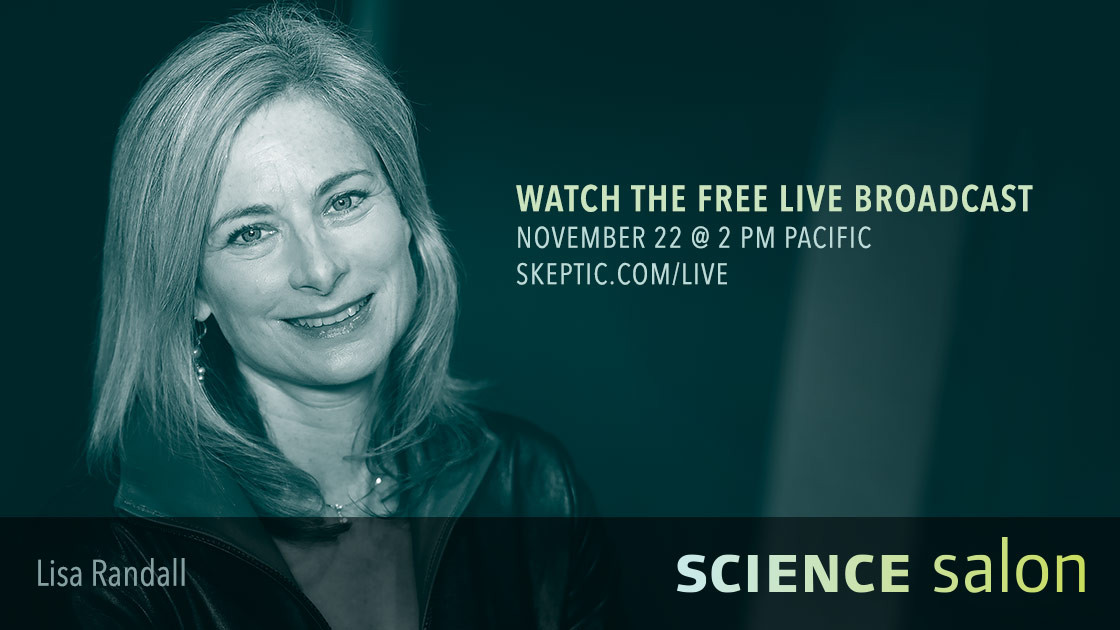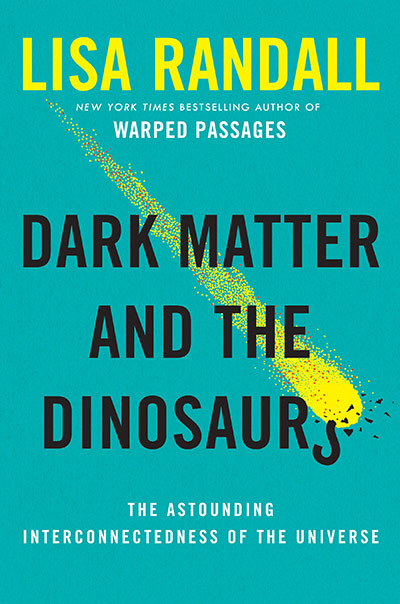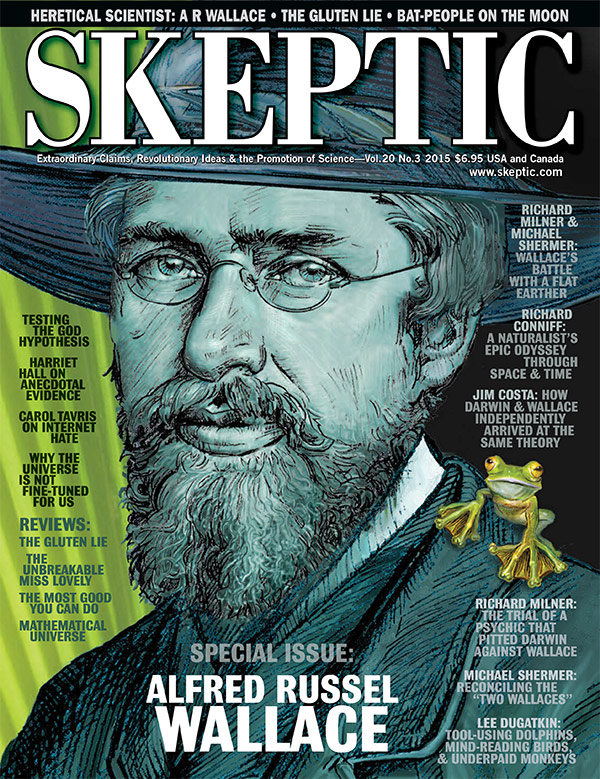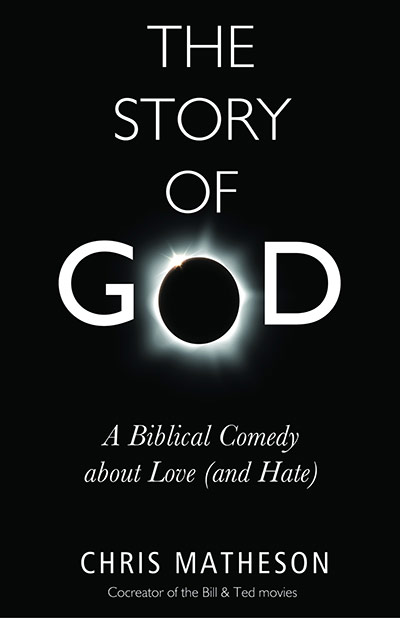In this week’s eSkeptic:
SCIENCE SALON THIS SUNDAY
Dark Matter and the Dinosaurs: The Astounding Interconnectedness of the Universe
The renowned Harvard cosmologist and theoretical physicist explores a scenario in which a disk of dark matter—the elusive stuff in the universe that interacts through gravity like ordinary matter, but that doesn’t emit or absorb light—dislodged a comet from the Oort cloud that was ultimately responsible for the dinosaurs’ extinction. Randall teaches us an enormous amount about dark matter, our Universe, our galaxy, asteroids, and comets—and the process by which scientists explore new concepts. Order Dark Matter and the Dinosaurs from Amazon.
ADVANCE TICKETS REQUIRED
0
DON’T MISS MICHELLE FEYNMAN DEC. 20
The Quotable Feynman (& His Van)

Michelle Feynman (by M. Houseman)
Join us on December 20, 2015 to hear Michelle Feynman who will discuss the life and legacy of her father: Nobel prize-winning physicist Richard P. Feynman. Physicist Seamus Blackey will bring Feynman’s van, newly restored and recently featured on The Big Bang Theory, so you can get your photograph taken with the famous vehicle featuring Feynman diagrams. And, joining us will be special guest Dr. Leonard Mlodinow, physicist and author of Feynman’s Rainbow: A Search for Beauty in Physics and in Life and The Upright Thinkers: The Human Journey from Living in Trees to Understanding the Cosmos.
ADVANCE TICKETS REQUIRED
14
WATCH THE FREE LIVE BROADCAST
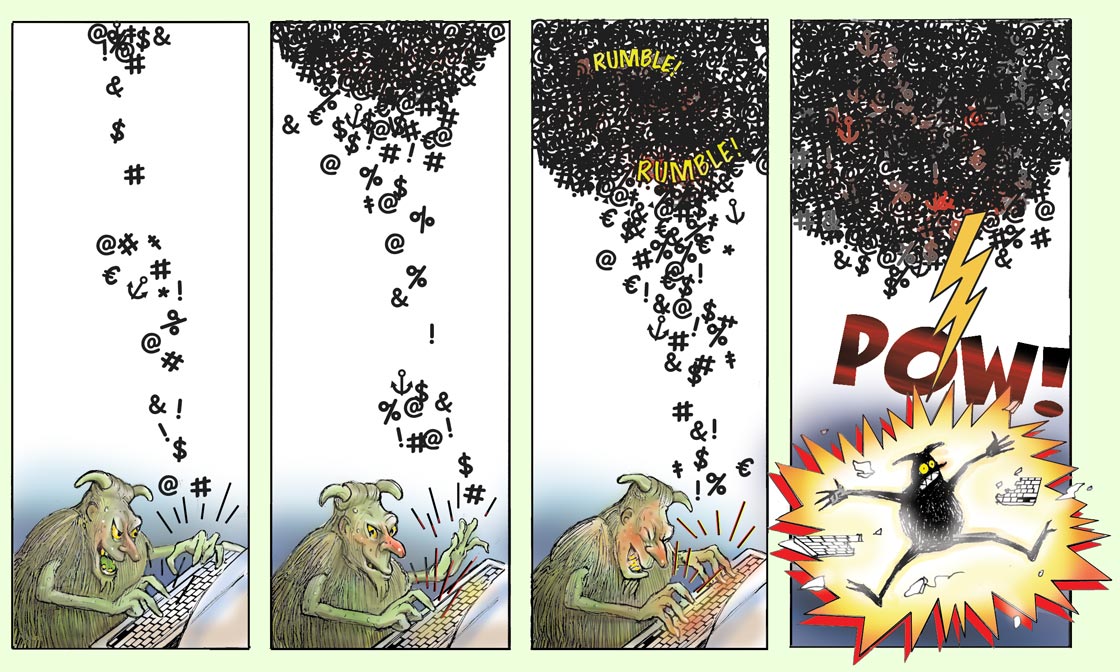
About this week’s eSkeptic
Can venting angrily on the Internet lead to heart disease? In this week’s eSkeptic, Carol Tavris discusses some research that points to a significant correlation between our negative language patterns (such as anger, hatred, and aggression) and health risks such as heart disease.
Dr. Carol Tavris is a social psychologist and coauthor, with Elliot Aronson, of Mistakes Were Made (but not by ME).
An Internet Story for Our Time
by Carol Tavris
The story that follows is prehistoric. It involves a once-famous columnist, a letter (the written kind), the U.S. post office, an apology, and a moral.
The columnist was Russell Baker, who had written an essay that I, in my self-righteous gadfly-in-training youth, regarded as a sarcastic dismissal of what was then called women’s liberation—the movement for mere improvements in education, work, family life, reproductive rights, and so forth. These issues were important to me, so I wrote him a letter, full of what I thought were equally sarcastic, witty put-downs. I failed to sleep on it overnight. I mailed it.
Baker returned my letter to me— edited. I’d irked him, and he had written all over the margins with sparky annoyance.
I replied, apologizing for my rude tone and explaining what I’d meant to say.
He replied warmly, and ended, “Could this be the beginning of a beautiful and civilized correspondence?”
At the time, researchers in many fields, from social psychology to epidemiology, were rapidly dismantling the “catharsis hypothesis,” held by millions of therapists, group leaders, teachers, and parents who believed that it was important for a person’s mental and physical health to ventilate their anger. (You can still buy bats and dolls to use for this reason in the privacy of your own home.) This belief stemmed from a misreading of Freud, who thought that aggressive energy builds up in us like steam in a teapot, and will boil right over in disastrous ways if not “let out.” However, they missed part 2 of Freud’s argument, which was that the “letting out” part should be sublimated into constructive activities, such as creating art. Freud would have been horrified by the many therapists who were handing out bataca bats to violent teenagers and to quarreling married couples with instructions to pound away…

Based on The Bible
SKEPTICALITY EPISODE 263
In this episode of Skepticality, Derek chats with author/filmmaker Chris Matheson about his recently released book The Story of God: A Biblical Comedy about Love (and Hate), which is a funny look at the events described in the Bible from the perspective of God and how the divine fumbles its way through the origins of reality and all we know. Find out more about how the man who helped create and film classic movies featuring Bill and Ted came to write a story which has a supreme being as its main character.
Make your 2015 donations before
the end of the year.
Help your Skeptics Society—a 501(c)(3) nonprofit educational organization—to promote science and critical thinking. You can make a tax-deductible donation online using your credit card, or by downloading a printable donation card to make your donation by cheque. You may also make a donation by calling 1-626-794-3119. All donations are tax deductible.


